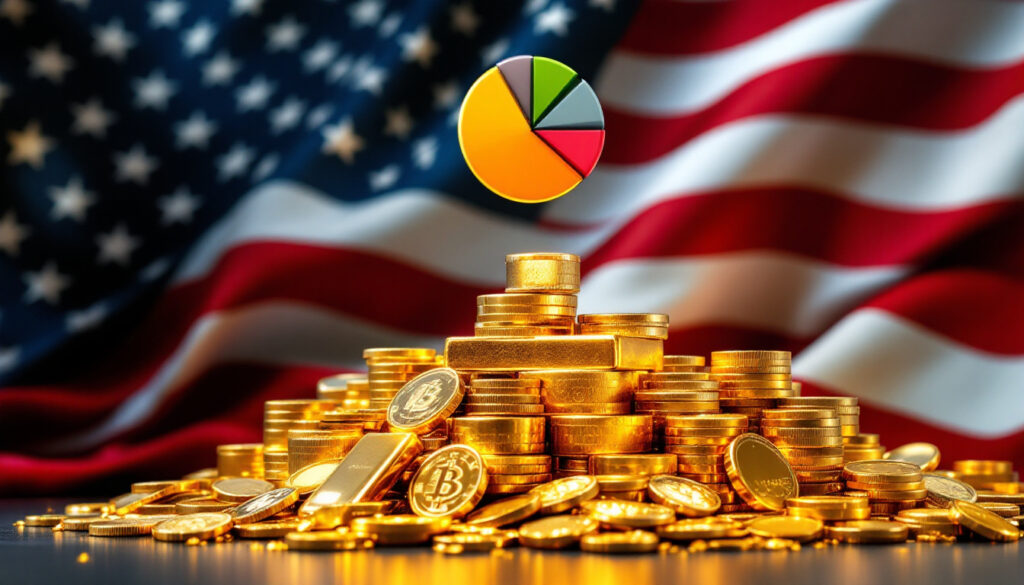Why Are Gold and Silver Taxed Differently Than Other Forms of Money?
Gold and silver hold a unique position in American financial history. While the U.S. Constitution explicitly recognizes these precious metals as money, they face inconsistent tax treatment across different states and at the federal level, creating a fundamental contradiction in how we define and handle currency.
The Constitutional Status of Precious Metals
The U.S. Constitution (Article I, Section 10) explicitly recognizes gold and silver as legal tender. Despite this constitutional foundation, seven states still impose sales taxes on precious metals purchases as of 2023, according to the Sound Money Defense League's annual Sound Money Index.
"Politicians have burdened gold and silver with taxation, making it impossible for them to function as money. This violates the constitutional principle of treating them as money rather than commodities," explains JP Cortez, Executive Director of the Sound Money Defense League.
This contradiction becomes clear when examining the legal framework. While the Constitution's Coinage Clause (Article I, Section 8) grants Congress power to regulate currency, state-level sales tax policies on precious metals create a patchwork system that undermines their status as constitutional money.
The Taxation Contradiction
The inconsistency in how currency is taxed becomes obvious through a simple comparison:
- When you exchange a dollar bill for four quarters, no sales tax applies
- When you exchange dollars for gold or silver coins, several states impose sales taxes of 5-7%
This creates an unusual situation where exchanging one form of constitutional money (dollars) for another (gold/silver) triggers taxation in states like Vermont (7%), Maine (5.5%), and Hawaii (4%), despite both transactions essentially being exchanges of money.
"Imagine being charged sales tax when breaking a $20 bill into singles. That sounds absurd, yet that's essentially what happens when buying gold or silver in many states." – JP Cortez
This contradiction particularly impacts ordinary citizens seeking to protect their savings from inflation through gold as inflation hedge.
What Types of Taxes Apply to Gold and Silver?
Precious metals investors face multiple layers of taxation that create significant barriers to using gold and silver as both investments and transactional currency. Understanding these tax burdens is essential for anyone considering precious metals as part of their financial strategy.
Sales Tax on Purchases
Several states impose sales taxes ranging from 4% to 7% when purchasing precious metals:
- New Mexico: 5%
- Washington: 6.5%
- Vermont: 7%
- Hawaii: 4%
- Maine: 5.5%
This immediate tax burden means your investment loses 4-7% of its value before you even take possession of your metals. For an investor purchasing $10,000 in gold in Washington state, this represents an immediate $650 loss.
Capital Gains Tax on Sales
The IRS classifies precious metals as "collectibles" under Internal Revenue Code §408(m), subjecting them to a maximum 28% federal long-term capital gains rate—significantly higher than the 15-20% rate applied to stocks and most other investments.
What makes this classification particularly problematic is that the IRS taxes nominal gains without adjusting for inflation. As JP Cortez explains: "The IRS's 'collectible' designation ignores gold's monetary role. Inflation-adjusted gains are often illusory but still taxed."
For example, gold purchased in 2000 at $300/oz and sold in 2023 at $2,000/oz would incur capital gains tax on the $1,700 "profit," even though much of that gain merely reflects the dollar's diminished purchasing power.
Business and Occupation Taxes
Some states impose additional Business & Occupation (B&O) taxes specifically on precious metals dealers. Washington state, for instance, adds this layer of taxation on top of its sales tax, further increasing costs that ultimately get passed to consumers.
These B&O taxes typically range from 0.5% to 1.5% of gross receipts, creating additional overhead that raises retail premiums on precious metals products.
Which States Tax Gold and Silver Purchases?
The tax landscape for precious metals varies dramatically across the United States, creating a patchwork of policies that impacts investors differently based on location. This inconsistency often drives business across state lines and influences where investors choose to make their purchases.
States With Sales Tax on Precious Metals
As of 2023, states still imposing sales taxes on precious metals purchases include:
| State | Sales Tax Rate | Notes |
|---|---|---|
| Vermont | 7.0% | No exemptions |
| Maine | 5.5% | Limited numismatic exemptions |
| Hawaii | 4.0% | Full taxation |
| New Mexico | 5.0% | No exemptions |
| Washington | 6.5% | Recently reimposed |
| Virginia | 5.3% | Exemption sunset in 2022 |
| Maryland | 6.0% | Exemption removed in 2020 |
States Moving Backward on Sound Money Policies
Several states have recently reversed previous tax exemptions, creating new barriers for precious metals investors:
- Washington: Eliminated its sales tax exemption amid a reported $16 billion budget shortfall (WA State Legislature, SB 5794, 2024)
- Virginia: Allowed its sales tax exemption sunset clause to expire, automatically reimposing taxes
- Maryland: Explicitly removed its previous exemption through new legislation (HB 732)
These policy reversals reflect how precious metals are often viewed as revenue targets during budget challenges, despite the economic consequences of such taxes.
States Leading in Sound Money Policies
In contrast, several states have embraced comprehensive sound money policies:
- Wyoming: Eliminated all taxation on precious metals and established a state bullion depository
- Utah: First state to recognize gold and silver as legal tender (2011)
- Idaho: Removed sales tax (2016) and income tax (2021) on precious metals
- Tennessee: Removed sales tax and income tax, established a $65 million state gold reserve
- Arkansas: Eliminated sales tax (2021) and later capital gains tax on precious metals
- Alabama: Passed comprehensive precious metals tax reform (SB 297, 2022)
These states recognize gold and silver's monetary role and have created favorable environments for citizens seeking to protect their wealth.
How Do These Taxes Impact Investors and the Economy?
The taxation of precious metals creates ripple effects throughout local and national economies, affecting everything from individual investment decisions to state tourism revenue and dealer locations.
Driving Business Across State Lines
States that tax precious metals often lose business to neighboring tax-free states. According to a survey by the Industry Council for Tangible Assets, approximately 40% of Washington state dealers reported losing customers to neighboring Idaho and Oregon after Washington reimposed its sales tax.
This cross-border shopping isn't just theoretical—it's a documented economic phenomenon:
- Coin dealers frequently relocate to tax-free states
- Investors travel to make large purchases in tax-exempt jurisdictions
- Online dealers ship from tax-free states to minimize customer costs
"When states tax precious metals, they're not actually generating new revenue—they're just pushing business across state lines. It's a lose-lose situation." – JP Cortez
Convention and Tourism Losses
States imposing sales taxes on precious metals often lose coin shows, conventions, and related tourism dollars to states with more favorable tax policies:
- Major coin shows can bring 5,000+ attendees to a city
- Convention attendees typically spend on hotels, restaurants, and other local businesses
- Louisiana lost approximately 12 coin shows annually after imposing its tax (American Numismatic Association report, 2016)
These events represent significant economic activity that tax-friendly states capture at the expense of high-tax jurisdictions.
Case Study: Louisiana's Tax Reversal
Louisiana's experience provides a compelling case study in the unintended consequences of taxing precious metals:
- Initial Policy: In the mid-2010s, Louisiana imposed a sales tax on precious metals
- Immediate Impact: Dealers began relocating to Texas and other neighboring states
- Economic Consequences:
- Loss of coin shows and conventions to other states
- Reduction in overall tax revenue despite new tax
- Diminished access for Louisiana residents
- Policy Reversal: The following year, Louisiana reversed course and reinstated the exemption
This pattern has repeated in other states, demonstrating how these taxes often fail to achieve their revenue goals while creating economic harm.
Barrier to Inflation Protection
Perhaps most significantly, these taxes create substantial barriers for average citizens seeking to protect their savings from inflation through precious metals ownership.
For example, an investor in Washington state faces:
- 6.5% sales tax on purchase
- 28% capital gains tax on sale (federal)
- Additional state income tax in many cases
These combined taxes can reduce real returns by 30% or more, making it significantly more difficult for ordinary savers to preserve purchasing power during inflationary periods.
What Is Being Done to Reform Gold and Silver Taxation?
Several organizations are working at both state and federal levels to reform the taxation of precious metals, with significant progress in recent years despite some setbacks.
The Sound Money Defense League's Approach
Founded in 2014, the Sound Money Defense League works to reform precious metals taxation through a comprehensive strategy:
- Eliminate state sales taxes on precious metals
- Remove state capital gains taxes on precious metals
- Reaffirm gold and silver as constitutional legal tender
- Establish state-level gold reserves as inflation hedges
- Reform federal taxation of precious metals
This multi-pronged approach addresses both immediate tax burdens (sales tax) and longer-term investment disincentives (capital gains tax).
Recent State-Level Victories
The Sound Money Defense League has helped achieve significant policy wins across the country:
- Arkansas (2021): Eliminated sales tax through targeted legislation and later removed capital gains tax on precious metals
- Tennessee (2021): Removed both sales tax and income tax on precious metals, now working toward establishing a $65 million state gold reserve
- Alabama (2022): Passed comprehensive tax reform (SB 297) after grassroots campaign generated over 2,000 constituent letters
- 14 states total have eliminated state capital gains taxes on precious metals, creating tax-advantaged environments for investors
These victories demonstrate the effectiveness of coordinated advocacy efforts focused on state legislatures.
Current Battleground States
Active efforts are underway to reform policies in several key states:
- Washington: Fighting newly imposed sales tax through grassroots opposition
- Virginia: Working to reinstate expired exemption through new legislation
- Maryland: Seeking to reverse recent tax imposition through targeted advocacy
According to the Sound Money Defense League's 2024 legislative tracker, 22 states have introduced some form of sound money legislation this year, reflecting growing momentum for reform.
What Federal Reforms Are Being Proposed?
While state-level reforms are important, federal tax policies remain the largest barrier to treating gold and silver as money. Several federal initiatives aim to address these issues.
The Monetary Metals Tax Neutrality Act
Introduced by Congressman Alex Mooney (West Virginia) as H.R. 8279, this legislation would:
- Eliminate federal capital gains tax on precious metals
- Automatically remove state capital gains taxes in most states that base calculations on federal returns
- Remove a major friction point for using gold and silver as transactional currency
The bill's supporters argue that taxing the exchange of dollars for gold and silver—both constitutional forms of money—creates a fundamental contradiction in policy.
"This legislation would eliminate a significant barrier to using gold and silver as everyday currency. The capital gains tax effectively prevents metals from circulating as money." – JP Cortez
The bill has gained bipartisan support but remains in committee as of 2024. Similar legislation has been introduced in previous sessions without reaching a floor vote.
Gold Reserve Transparency Act
This proposed legislation addresses concerns about America's gold reserves through comprehensive verification requirements:
- Complete physical inventory of all U.S. gold reserves
- Full assay testing to verify authenticity and purity using X-ray fluorescence to detect potential tungsten plating
- Accounting of all transactions involving America's gold over the past 50 years
- Verification of ownership status and any encumbrances
- Regular ongoing audits rather than one-time checks
- Refinement of existing gold to meet modern market standards
The bill responds to concerns that Fort Knox and other depositories haven't received proper audits since 1953, with only limited inspections in subsequent decades.
Why Is Gold Reserve Transparency Important?
The status of America's gold reserves has significant implications for national and global financial systems, particularly as central banks worldwide increase their gold market performance.
Growing Global Interest in Gold Reserves
Central banks worldwide are accumulating gold at historic rates as a hedge against currency instability and as part of de-dollarization strategies:
- Central banks purchased 1,037 tonnes of gold in 2023 (World Gold Council, 2024)
- This represents the highest level of central bank buying in decades
- Nations like China, Russia, Poland, and Turkey have significantly increased reserves
- Many countries are repatriating gold previously stored in New York or London
This trend reflects growing concerns about currency stability and heightened interest in tangible assets as monetary anchors.
Potential Economic Implications of Reserve Verification
If U.S. gold reserves were found to be compromised through a comprehensive audit, several significant market reactions could occur:
- Gold prices would likely surge dramatically as markets price in reduced supply
- Mining company valuations would increase substantially due to higher gold prices
- Confidence in the U.S. dollar as reserve currency could deteriorate
- Accelerated movement away from dollar-denominated assets could occur
These potential consequences underscore the importance of transparency regarding national gold reserves.
Taxpayer Ownership Rights
The gold in Fort Knox and other depositories belongs to American taxpayers, not the government itself. This fundamental point is often overlooked in discussions about national reserves.
According to the U.S. Treasury, Fort Knox reportedly holds approximately 147.3 million ounces of gold. At current market prices ($2,300/oz), this represents over $338 billion in assets ultimately owned by taxpayers.
Citizens have the right to verification that these assets are being properly managed, just as they would expect proper accounting for other national resources and assets.
How Can You Take Action on Precious Metals Taxation?
Individual citizens have significant power to influence policy, particularly at the state level where legislators are more accessible and responsive to constituent concerns.
Engaging With State Legislators
State-level engagement is often more effective than federal advocacy for several reasons:
- Closer representation: State legislators typically represent fewer constituents
- Local connections: Representatives often live in the communities they serve
- Direct accessibility: Most state legislators maintain regular office hours and local meetings
- Fewer competing issues: State legislatures handle fewer bills than Congress
The most effective forms of communication include:
- Phone calls to state representatives during crucial votes
- Emails to committee members before hearings (personalized, not form letters)
- Physical postcards and letters (which receive special attention in legislative offices)
- In-person testimony at committee hearings (particularly impactful)
"Postcards get attention. Legislators prioritize physical mail over emails because it demonstrates greater commitment from constituents." – JP Cortez
Joining Advocacy Networks
The Sound Money Defense League maintains an action alert system that supports grassroots advocacy:
- Categorises supporters by zip code to target relevant legislators
- Sends targeted alerts when legislation affects your state
- Provides pre-written messages and contact information
- Makes legislator contact simple through one-click systems
With approximately 400,000 subscribers (2024 internal data), this network has proven effective in influencing state-level policy decisions.
Understanding Your State's Policies
The annual Sound Money Index ranks all 50 states based on their precious metals policies, helping investors:
- Identify states with favorable tax environments
- Understand specific policy differences between states
- Make informed decisions about where to purchase or store metals
This resource provides actionable information for both advocacy and personal investment decisions.
What Is the Future of Gold and Silver Taxation?
The landscape of precious metals taxation continues to evolve amid changing economic conditions, with several key trends shaping future developments.
Growing Interest in Sound Money Policies
More states are considering comprehensive sound money legislation amid broader economic concerns:
- Persistent inflation: Official inflation rates have remained elevated since 2021
- Growing distrust in traditional financial systems after banking instability
- Increased interest in financial sovereignty and independence
- Recognition of historical monetary precedents during economic uncertainty
These factors have created fertile ground for sound money advocacy, with 22 states introducing related legislation in 2024 alone.
Potential Federal Policy Shifts
Recent political developments suggest potential changes in federal approaches to gold and silver:
- Increased discussion of gold stock relationship principles in policy circles
- Growing support for Fort Knox audit legislation across party lines
- Bipartisan interest in monetary metals tax reform
- Recognition of gold's role in international monetary systems
Campaign remarks by former President Trump about returning to a gold standard reflect growing mainstream discussion of precious metals' monetary role.
International Context
The U.S. debate over taxes on gold and silver exists within a global context
Ready to Protect Your Wealth From Tax Inefficiencies?
Discover how to optimise your precious metals investments with real-time alerts on significant ASX mineral discoveries through Discovery Alert's proprietary Discovery IQ model, ensuring you have the insights to make informed decisions in this complex tax landscape. Explore our dedicated discoveries page to understand why major mineral discoveries can lead to substantial market returns even amid challenging tax environments.




